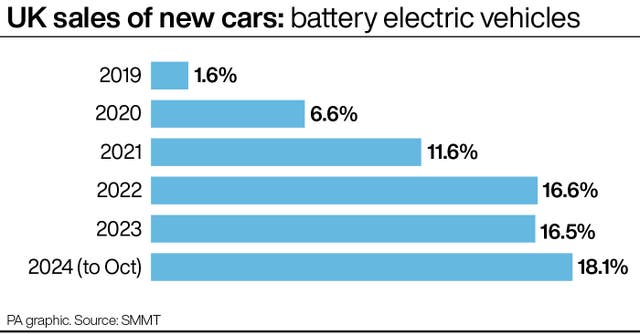The problems facing car manufacturers as they shift to electric vehicles are not confined to Stellantis, Business Secretary Jonathan Reynolds warned after the Vauxhall owner announced plans to close its Luton plant.
Mr Reynolds said ministers did “everything we possibly” could to prevent the closure, which Stellantis said was made within the context of the “stringent” UK zero-emission vehicle (ZEV) mandate.
The Business Secretary confirmed plans to review the ZEV mandate, which sets strict targets for manufacturers to sell electric vehicles, as part of a consultation on the Labour government’s plan to ban the sale of new “purely petrol and diesel” cars by 2030.
Organizations
Topics
Mr Reynolds said the announcement of the Luton closure, which puts 1,100 jobs at risk, was a “dark day”.
But in a warning there could be further problems, beyond the Stellantis announcement and Ford’s plans to shed 800 jobs over three years, Mr Reynolds told MPs: “These challenges are not confined to any one company.
“Car manufacturers around the world are battling with increased costs, supply chain issues and changing consumer demand in a highly competitive, fast-evolving market.”
He added: “Many of the challenges faced by our car manufacturers are global in nature and they cannot be resolved by UK government intervention alone.”
But he said that “decarbonisation must not mean deindustrialisation” and promised to work with the industry on the transition to cleaner cars and vans.
“Winning the race to net zero and having a world-leading automotive sector must go hand in hand,” he said.
The ZEV mandate requires major car manufacturers to have zero-emission – in effect purely electric – vehicles making up 22% of their sales fleet this year, increasing to 28% in 2025 and rising further in subsequent years.
If the manufacturer does not hit the target, it will be fined £15,000 for every vehicle that it sells that does not comply with the mandate.
The targets were laid out under the Conservative administration, which set a deadline of 2035 for phasing out the sale of new petrol and diesel-powered cars.

Labour plans to bring that deadline forward to 2030 although Mr Reynolds’ suggestion it will apply to “purely” fossil fuel-powered cars means hybrids may be able to be sold beyond that date.
Labour’s election manifesto promised a “phase-out date of 2030 for new cars with internal combustion engines”, causing industry anxiety over the future of hybrids, which use electric batteries along with petrol or diesel power.
Mr Reynolds told the Commons: “We will be shortly fast-tracking a consultation on our manifesto commitment to end the sales of new purely petrol and diesel cars by 2030.
“But we will use that consultation to engage with industry on the previous government’s ZEV transition mandate and the flexibilities contained within it.”
Shadow business secretary Andrew Griffith told the Commons: “The closure of the Luton plant, I fear, is just a down payment on jobs that will be lost under this Government’s relentless attacks on industry, its neglect of the realities of business, and its failure to meet its promise not to raise taxes.”
He said it “is the direct result of a Government policy that is simply unworkable for industry”.
Sir Keir Starmer and Tory leader Kemi Badenoch also clashed over the issue at Prime Minister’s questions.
Mrs Badenoch pressed the Prime Minister on whether he would stick to the 2030 deadline if it meant “more jobs will be lost”.
Sir Keir told Mrs Badenoch the ZEV mandates were “actually introduced by the last government” and “she was the business secretary that introduced them”.













